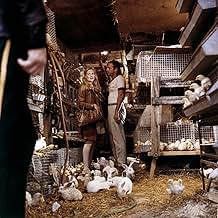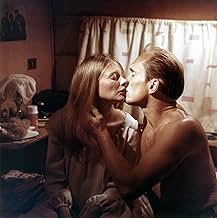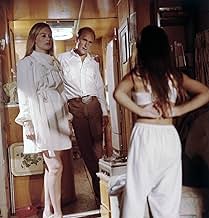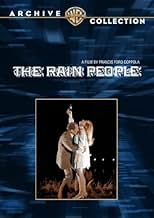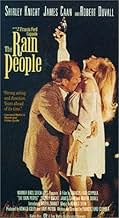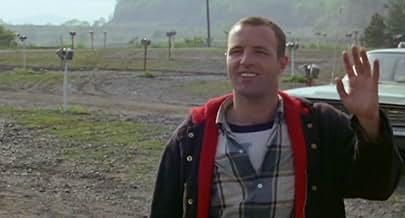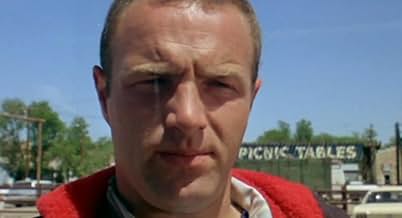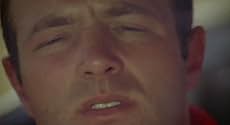IMDb रेटिंग
6.8/10
4.5 हज़ार
आपकी रेटिंग
जब एक गृहिणी को पता चलता है कि वह गर्भवती है, तो वह अपने जीवन के फैसलों का पुनर्मूल्यांकन करने की स्वतंत्रता की तलाश में शहर से बाहर निकलती है।जब एक गृहिणी को पता चलता है कि वह गर्भवती है, तो वह अपने जीवन के फैसलों का पुनर्मूल्यांकन करने की स्वतंत्रता की तलाश में शहर से बाहर निकलती है।जब एक गृहिणी को पता चलता है कि वह गर्भवती है, तो वह अपने जीवन के फैसलों का पुनर्मूल्यांकन करने की स्वतंत्रता की तलाश में शहर से बाहर निकलती है।
- पुरस्कार
- कुल 1 जीत
Laura Crews
- Ellen
- (as Laurie Crews)
Garrett Cassell
- Farmer
- (बिना क्रेडिट के)
Eleanor Coppola
- Gordon's Wife
- (बिना क्रेडिट के)
फ़ीचर्ड समीक्षाएं
Early Coppola with sublime cast that most folks never got to see (a pity). There's some wonderful things going on in this one - Shirley Knight's best performance (an underrated actress), a road trip in the late 1960's, James Caan very restrained and moving, Robert Duvall in a part he was born to play (edgy, lonely, motorcycle cop), and a touching script with F. Coppola behind the wheel.
If this had been made five years LATER by some nobody, it would have been a smash (so much for timing). Anyway, I recommend this to all people who don't need outer-space explosions and bad mother-in-law jokes or a billion dollar budget to sit for a few hours and watch a story unfold. Give this one a chance if you can find it!
If this had been made five years LATER by some nobody, it would have been a smash (so much for timing). Anyway, I recommend this to all people who don't need outer-space explosions and bad mother-in-law jokes or a billion dollar budget to sit for a few hours and watch a story unfold. Give this one a chance if you can find it!
Francis Ford Coppola's first 'personal' film, completed and released in 1969, was the last movie he made as a mostly unknown, up and coming director before The Godfather, and is in stark contrast to both that film, and the rest of his uneven career. It's ostensibly a road movie involving a disconnected young woman bored with domestic life, and pregnant with a child she isn't sure she wants, fleeing the trappings her dull marriage and hitting the open road in search of freedom. Along the way she befriends a nice man, an ex-footballer player that suffered brain damage from a traumatic head injury, played in unexpectedly subtle fashion by a young James Caan, and decides to 'help' him, despite becoming frustrated with his simple ways. Her efforts to rid of him always fail, either by guilt or chance, and eventually lead her directly into the hands of an emotionally wounded cop(Robert Duvall), who has ideas of his own. The plot is threadbare, but Coppola does a great job at detailing the emotional life of these characters, and uses editing techniques to relay back story that were not at all common in American films of the time. Shots are simple, yet extraordinarily effective, conveying both the moody desolation of the open highway, and the emptiness of American suburban life, infused with a gentle melancholy provided by the film score. Coppola also deserves credit for addressing the issue of domestic discontent from a woman's point of view in the culturally turbulent 60's. Overall, a fairly low-key film that is not what audiences have come to expect from Coppola, but one that is a minor triumph in its own quiet, unassuming way. 7.5/10.
Shirley Knight plays Sara Ravenna, a Long Island housewife who runs away from her marriage when she discovers she is pregnant. She plans to drive into America's heartland and start anew. Along the way she picks up a friendly hitchhiker (James Caan) who calls himself 'Killer.' Soon she discovers that the good natured 'Killer' is actually brain damaged, and by picking him up she has unknowingly taken on a huge responsibility. The two of them drive all the way to Nebraska, where Sara gets Killer a job helping out at a roadside reptile farm. It is here that Sara meets Gordon, a local cop, and soon things go horribly wrong for everyone.
This is a powerful drama about people disconnected from society, alienated by the choices they make or by the limits imposed on them by others. Even with such a low budget and a very freewheeling attitude, the film is able to capture everything that needs to be said through these clearly defined characters. Shirley Knight has a complex, diverging role and there are moments of some awe-inspiring acting by her. One of my favorites is when she is on the telephone calling her home to her worried husband the first time. It is such a tense scene on both ends, and in every small gesture and inflection of a word, so much about her is spoken with so little. Then comes in the character of 'Killer' played by James Caan. This character is unlike any I've ever seen him play, and he performs wonderfully. It's one of his best performances as he is very restrained and moving.
The way Coppola develops the characters by using short, dream-like flashbacks is very clever, adding a fragmented kind of view onto it all. The quick flashbacks that are graphic and self-contained contrast well with the longer shots in some crucial scenes. Also, because this film was shot on location all over the Eastern U.S., it offers an interesting, authentic look at America in the late 1960's.
I haven't seen many other films starring Ms. Knight, I'm only familiar with her more recent work on television, usually playing a nagging mother in law or a dotty old woman. It was great seeing her so young, beautiful, and so wonderfully subtle in this movie. It's also kind of a shame that James Caan went on to be typecast as the 'tough guy' for the rest of his career, because this film evidenced that he is capable of so much more than that.
This is a powerful drama about people disconnected from society, alienated by the choices they make or by the limits imposed on them by others. Even with such a low budget and a very freewheeling attitude, the film is able to capture everything that needs to be said through these clearly defined characters. Shirley Knight has a complex, diverging role and there are moments of some awe-inspiring acting by her. One of my favorites is when she is on the telephone calling her home to her worried husband the first time. It is such a tense scene on both ends, and in every small gesture and inflection of a word, so much about her is spoken with so little. Then comes in the character of 'Killer' played by James Caan. This character is unlike any I've ever seen him play, and he performs wonderfully. It's one of his best performances as he is very restrained and moving.
The way Coppola develops the characters by using short, dream-like flashbacks is very clever, adding a fragmented kind of view onto it all. The quick flashbacks that are graphic and self-contained contrast well with the longer shots in some crucial scenes. Also, because this film was shot on location all over the Eastern U.S., it offers an interesting, authentic look at America in the late 1960's.
I haven't seen many other films starring Ms. Knight, I'm only familiar with her more recent work on television, usually playing a nagging mother in law or a dotty old woman. It was great seeing her so young, beautiful, and so wonderfully subtle in this movie. It's also kind of a shame that James Caan went on to be typecast as the 'tough guy' for the rest of his career, because this film evidenced that he is capable of so much more than that.
Five years earlier and I doubt the movie could have found a distributor. It's slow, contemplative, and nothing much happens until the end. But for those who follow inner conflict as well as outer, it's a stunner. Pregnant suburban wife Knight hits the road, fleeing a consuming marriage. But she's not just fleeing, she's also aimlessly searching—note how she first bypasses Caan before hazily backing up. Trouble is Caan's brain damaged, and in need of adult supervision. Now Knight's in a pickle. On one hand, her budding maternal instinct kicks in; on the other, a grown child is too much what she's fleeing from. Thus, the confusion of her life mounts. But hey, she meets macho cop Duvall who's got adventure written all over him. Yet he turns out to be domineering and mean, probably too much like the husband she's abandoned. This leads up to an ending that is both touching and ironic.
For expansive post-war couples the suburbs were liberating; but a generation later and younger folks like Knight felt confined. This is a 60's road picture feminine style. When Americans get restless or unhappy, they head westward in frontier tradition. So why shouldn't a woman, even when alone and vulnerable. The acting here is outstanding, and it better be since character carries the story or what there is of it. I really like Caan who shows why less is sometimes more. And get a load of those desolate roadsides, no cosmetic Hollywood here. Too bad the film's so obscure in the Coppola canon. All in all, it's a telling reflection of a restless time, perhaps even of what some call the human condition. However, I can understand why it's not everyone's cup of tea, and certainly a long way from Coppola's next, The Godfather (1972).
For expansive post-war couples the suburbs were liberating; but a generation later and younger folks like Knight felt confined. This is a 60's road picture feminine style. When Americans get restless or unhappy, they head westward in frontier tradition. So why shouldn't a woman, even when alone and vulnerable. The acting here is outstanding, and it better be since character carries the story or what there is of it. I really like Caan who shows why less is sometimes more. And get a load of those desolate roadsides, no cosmetic Hollywood here. Too bad the film's so obscure in the Coppola canon. All in all, it's a telling reflection of a restless time, perhaps even of what some call the human condition. However, I can understand why it's not everyone's cup of tea, and certainly a long way from Coppola's next, The Godfather (1972).
Francis Ford Coppola wrote and directed this stunningly personal story of a married woman's flight from her husband--and the reality that perhaps the youthful glee and excitement of her younger years are behind her. We learn little about this woman's marriage except that she has been feeling her independence slipping away as of late; she's also recently learned she's pregnant, which has further complicated her heart (she doesn't want to be a complacent wifey, despite the maternal way she speaks to her husband over the phone). She meets two men on her journey: a former college football hero who--after an accident during a game--has been left with permanent brain damage, and a sexy, strutting motorcycle cop who has a great deal of trouble in his own life. The clear, clean landscapes (as photographed by the very talented Wilmer Butler) are astutely realized, as are the characters. Shirley Knight, James Caan, and Robert Duvall each deliver strong, gripping performances, most especially since these are not very likable people in conventional terms. Some scenes (such as Knight's first call home from a pay-phone, or her first night alone with Caan where they play 'Simon Says') are almost too intimate to watch. Coppola toys with reality, turning the jagged memories of his characters into scrapbooks we've been made privy to. He allows scenes to play out, yet the editing is quite nimble and the film is never allowed to get too heavy (there are at least two or three very frisky moments). It's a heady endeavor--so much so that the picture was still being shown at festivals nearly five years later. Some may shun Coppola's unapologetic twisting of events in order to underline the finale with bitter irony, however the forcefulness and drive behind the picture nearly obliterate its shortcomings. *** from ****
क्या आपको पता है
- ट्रिवियाThe parade scene was filmed in Chattanooga, Tennessee on Memorial Day. The students in the band were not aware of what was happening. In fact, reading the lips of a majorette, she can be seen asking, "Who was that guy?" as James Caan was weaving through the parade.
- गूफ़When Natalie first leaves her husband, she drives into a tunnel and emerges from on the west side of Manhattan. That is, she has driven east through the Lincoln Tunnel, presumably heading east. But immediately after, she stops at a phone booth to call her husband, saying she is in Pennsylvania, which is in the opposite direction. Had the intention to suggest a westward journey, she could have driven west through the tunnel to emerge in New Jersey.
- भाव
Natalie Ravenna: You are the most obedient man I've ever met in my life. Look at me. Aren't you?
Jimmy Kilgannon: Yes.
Natalie Ravenna: Aren't you?
Jimmy Kilgannon: Yes.
Natalie Ravenna: Aren't you?
Jimmy Kilgannon: Yes.
Natalie Ravenna: Aren't you?
Jimmy Kilgannon: Yes.
Natalie Ravenna: Alright.
टॉप पसंद
रेटिंग देने के लिए साइन-इन करें और वैयक्तिकृत सुझावों के लिए वॉचलिस्ट करें
- How long is The Rain People?Alexa द्वारा संचालित
विवरण
- रिलीज़ की तारीख़
- कंट्री ऑफ़ ओरिजिन
- भाषा
- इस रूप में भी जाना जाता है
- Dos almas en pugna
- फ़िल्माने की जगहें
- चैट्टानूगा, टेनेसी, संयुक्त राज्य अमेरिका(Veterans Day parade)
- उत्पादन कंपनियां
- IMDbPro पर और कंपनी क्रेडिट देखें
बॉक्स ऑफ़िस
- बजट
- $7,50,000(अनुमानित)
इस पेज में योगदान दें
किसी बदलाव का सुझाव दें या अनुपलब्ध कॉन्टेंट जोड़ें


